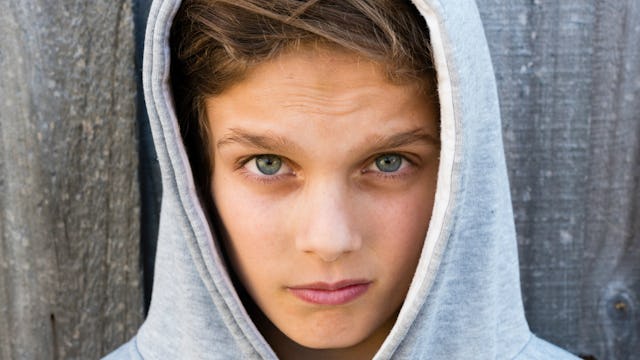Why Navigating The Tween Years Is So Freaking Hard

We went to the Oregon Garden for my wife’s birthday, and my 11-year-old son wasn’t having it. He didn’t want to go. At all.
He wanted to stay home and play online games with his friend. At first, he cried a little before leaving the house because of the injustice of having to attend a birthday celebration for his mother. Then he got irritated in the van because his younger sister wanted to listen to her Peppa Pig music. Then, once we made it to the garden he said it was boring, and stupid, and wanted to go back home. He dragged his feet, and asked for treats, and asked to use my phone. And each time I told him no, he looked at me like I was committing a crime.
He’s 11, almost 12. This makes him a pre-teen, and the reality is, I’m already over it, but clearly I have a long ways to go.
But Tristan is a good kid. He does well in school. His teachers enjoy him. He won the “Friend To Everyone” award last year, which I know sounds like something they just made up so everyone could get an award, but the reality is Tristan honestly goes out of his way to talk to everyone. I am proud of the little guy, but all that pride I have for him, and all the good nature he demonstrates outside of the home, doesn’t change the fact that his hormones are getting all twisted and out-of-control, so every time I ask him to feed the dog he looks at me like I’m a dick.
All of it is so over the top and exhausting that I want to run into the woods and live there until he’s ready for college. It gets more complicated when I realize that he’s the oldest, and I have two daughters behind him. And there are plenty of people in the same boat. You might be thinking about how your pre-teen flipped because you asked them to get their own glass of water, or asked them to hang up their towel, or not yell at their sister, or fight over who’s spot is who’s on the sofa… I did the same thing as a child.
Everyone did, but it wasn’t until now, when I’m knee-deep into it, that I realize how gracious my mother was. How lucky I am that she didn’t actually pull the family car over and leave me on the side of the road all those times she threatened to do so.
At one point, Tristan sat down next to a pond with a small water fountain, head in his hands, his face firm, eyes moist, hands tense: everything about him was thick with dissatisfaction. The family was moving on, everyone was enjoying themselves — except him. He didn’t say that he was refusing to keep going, but it was obvious that he was when he wouldn’t move after about a million times calling his name.
I told Mel to go on with the girls. I sat down next to him, trying to figure out what to say that would motivate him. I think a lot of parents do this. We know we have to say something, and part of us assumes some great speech will be fall in our lap, as though there is some a parenting muse for these kinds of situations. There isn’t, by the way.
I looked over at my son, and didn’t say anything. I tried to get him to respond to me, but he just looked forward, refusing to speak. Finally, I said, “This isn’t about you. None of this is about you. It’s about your mother.” I went on, reminding him that this was her birthday, and that we needed to respect that. I told him about how we do things on his birthday that we don’t enjoy. I told him that this is how the world works with family. I told him how I didn’t really want to be at the Oregon Garden, but I was doing it for his mother, because I love her.
Everything I said was perfectly calm and logical. It all made wonderful sense, and there was a moment when he looked up at me and I felt a pinch of excitement. I felt confident that I’d gotten through to him. “Does that all make sense?”
He looked back at the water and shrugged. He didn’t move. He didn’t agree. He just shrugged. All that amazing fatherly wisdom was for nothing. But with a pre-teen, I suppose logic, wisdom, parental wisdom are often nothing more than a drag. Any parent who has been through this phase understands. But in the moment, regardless of how much I was trying to be calm, all of it was pretty frustrating. Finally, I gave him a look, and an ultimatum: “If you don’t get moving and cut the crap, I’m taking away screens for a week.”
Once again, he gave me the I-hate-you look, but he got moving. But then the wildest thing happened. About 20 minutes later, we found a pond full of massive bullfrogs, and he forgot about the whole thing. He was back to his normal self, and we were all laughing.
I’m still trying to navigate this new phase. I’m still trying to figure out how to help my son, without losing my mind, or him hating me for the rest of forever. But if I’ve learned anything from this short time of having a pre-teen, it’s that the term “it’s a phase” should be changed to “it’s a wave.” Because the reality is, all those emotions, all that frustration, change like the streetlights. None of it really makes sense, and none of it is logical, and all of it keeps you on your toes.
This article was originally published on